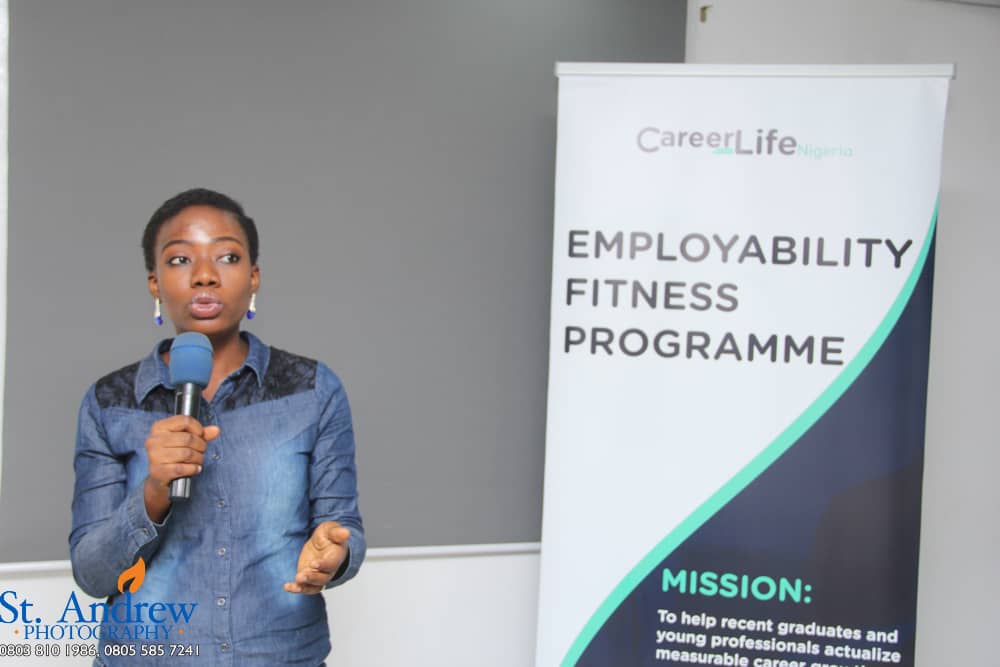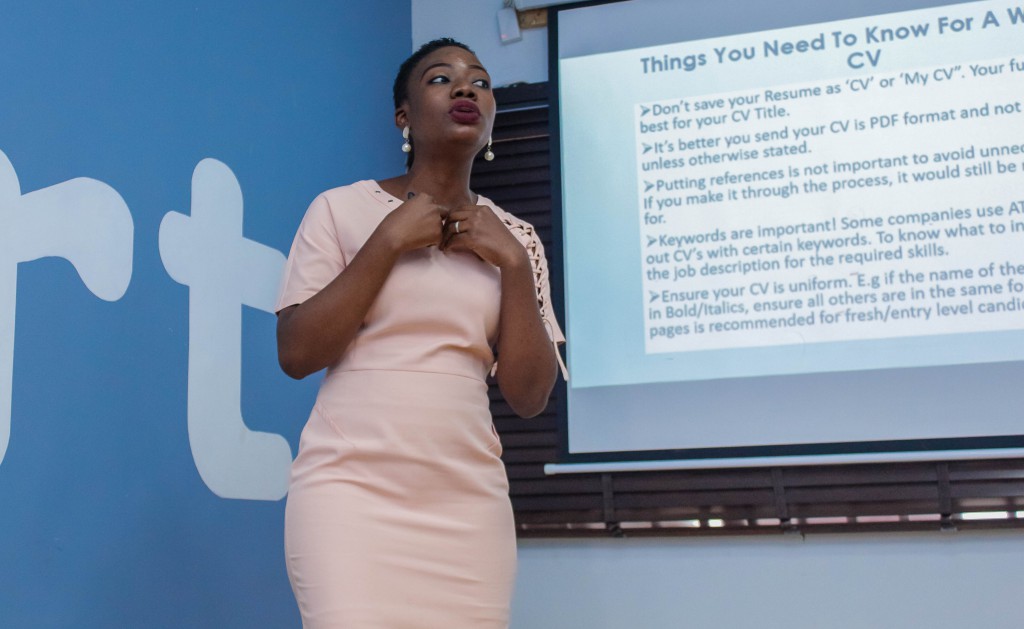Says “I believe women are more disadvantaged when it gets to career growth”
In 2017, Nigeria ranked 122th out of 144 countries in the Global Gender Gap report. Women are more adversely affected by economic and educational challenges compared to the average Nigerian. Despite the progress over the past few decades, gender equality in employment remains an elusive goal in Nigeria. Women still face disadvantage and discrimination in all areas of socioeconomic life. Yewande Jinadu is trying to bridge that Gap and solve the problem through her Careerlife Nigeria platform, an initiative aimed at reducing unemployment by providing people with the right career related information and coaching.

Yewande is a certified HR Professional and an Employability coach. She is passionate about People Development, Employability, Career Coaching and Human Resources. Through personal coaching, published articles and speaking engagements, she has helped hundreds of young professionals become more employable and gain employment. To further address the issue, She recently launched the Employability Fitness Program, an initiative aimed at helping young graduates (0-3 years’ experience) overcome interview Phobia and the barriers in Recruitment process through mentoring. It has had measurable impact in the lives of over 100 participants in few months.
She shares her inspiring story with me in this interview.
Childhood Influence
Let me start with the No part. I didn’t always know or plan or prepare for what I currently do right from when I was a child. I grew up with parents who were exposed and always supported their children in whatever they wanted to do. I grew up as a Mathematician and Analytical person. I was wired to think Maths was my only Super Power. It was later in life I realized, I had other superpowers.
YES because I grew up with a deflated self-esteem. Over time, I became better and began to appreciate and love myself more. This always made me want to give back to others. I remember starting Y-Trust Foundation immediately after NYSC with no job going for outreaches in secondary school and talking to students about the menace of low self-esteem. I was VERY passionate about giving back and helping people.
My ‘eureka’ moment was when I realized that I didn’t need to ‘have it all’ to make an impact. All I needed to do was start small and never stop fueling my passion.
Inspiration behind CareerLife Nigeria
CareerLife Nigeria was inspired by my personal struggle to get a job after NYSC. I did an internship in the HR department while in 400level and I was privileged to sit in a few interviews so I had learned a lot. After NYSC, I felt that exposure would make it easier for me to succeed with multiple offers but I struggled. I hated interviews because I always messed up. I knew I had a LOT to offer but felt so bad because I was always portraying the opposite. I overcame it after a while and moved from Chemical Engineering to HR.
This made me participate in numerous interviews and I saw other graduates struggle with making it past the rigorous recruitment process we have set just to get talents.
I realized it would take me a long time to be able to wield the power to change the face of recruitment in Nigeria so I decided to take baby steps.
I’ve always been interested in people’s Career Development. I had SO much information through the experience and exposure I got and the few people that have interacted with me in a short while always came back to thank me for the amount of impact I’ve had in their lives. I decided that rather than help just a few people, I would put the information out there for thousands of other people through writing and coaching.
My blog contains a LOT of information that would help the average young graduate who may not be able to afford Employability Training. The mission is to help young graduates and professionals attain measurable career growth, I’m fulfilling that mission daily through various platforms.

Employability fitness coaching
The Employability Fitness Program(EFP) was birthed to solve the personal issues people have with un-employment. The first edition was launched in July with a live mock interview with HR Professionals and Subject Matter Experts. Here, participants had the opportunity to get interviewed by professionals and given direct feedback that addresses their personal deficiency during interviews.
We want to help people overcome interview phobia (a problem a LOT of graduates have but is currently not being addressed). After the live mock session, it follows with a 3 months post-coaching which is aimed at handholding them till they finally get an offer. In the post-coaching group, we have HR professionals who have volunteered their time to coach and mentor the young graduates. We have weekly knowledge sharing session on topics the participants chose themselves.
We also post exclusive job openings that are seen through high-level referrals and we prepare participants for prospective interviews on the group. The group is FREE and open to fresh and young graduates.
Testimonies
Recently a lot of testimonies have come from the point of appreciating us for providing support when they needed it.Currently, we have recorded 11 testimonies from the coaching group when it started mid-July.
Others have recorded more interview invites because they have access to information that allows them review their CV’s themselves. Jobseekers now have the necessary support they need to thrive. A lot of graduates who have lost hope in getting a job now see the light at the end of the tunnel because of the support. We have 17 HR Professionals who have volunteered their time to support jobseekers 24/7 for the period of 3months.
The Monthly Twitter Mentoring Session has had impact in the lives of graduates as people reach out to us thanking us for saving them and help open their eyes from problems they have had.
If I had the opportunity to speak with the President on lack Employment
I’ll tell him to provide a favourable economy for businesses to thrive, for startups to grow, for young entrepreneurs to thrive, for jobs to be created and for graduates to be trained. I believe that THERE ARE JOBS. The educational system hasn’t just prepared the graduates well enough to be able to occupy them. I would advise the government to boost our educational system by including Employability in their course curriculum and employ professional career coaches in each university to help prepare them for the world ahead. CareerLife Nigeria and other organizations are working hard to build that gap but we can’t do it alone without help from the government.

Challenges
Majorly Funds to run these programs and initiatives. SO far, I’ve received support and accolades but funds are required to make more impact. Because it’s not a registered company YET. Most funds are gotten from personal purse and few friends who are passionate about the same thing.
On giving up
YES! Numerous Times! I can’t count the times I’ve felt like quitting. What I do with CareerLife Nigeria and other initiatives is a personal CSR and a future social enterprise. I have a full time job that can be demanding. I also have to juggle with wifely and motherly responsibilities too.
I practically spend my personal funds to run some initiatives. For the Employability Fitness Program (EFP), after the publicity was out, I wanted to cancel it or postpone it. I didn’t have the funds to do major things and I didn’t know how to ask people. I felt people would naturally support but only very few supported financially.
A lot of times I help people get good jobs with a good pay but personally I have a lot of unmet needs in my career. Having to sacrifice my time and juggle a lot of things hasn’t been easy but PASSION keeps me going.
Whenever I want to give up and I see the problems waiting to be solved, I remind myself that the more I delay this, the more people that need this initiative remain jobless and depressed. Whenever people reach out to me to thank me for helping them when they have lost hope, I get motivated
My self-worth is no longer how much is in my bank account but how much impact I’m able to make in the lives of others. I feel fulfilled when I see others happy in their career and I know that with time, it will get better for me.
Being a Woman of Rubies
I’m a woman of ruby because I’m selfless. All I do is think of how I can help young graduates with their career struggles.
My purpose in life is centered on giving back to others. I genuinely find JOY (not happiness) in helping people.
I love to mentor people, I love to coach people, I love to see people succeed in their career. My mission is to change the face of recruitment in Nigeria and then, in the world.
Unemployment in Nigeria
A lot needs to be done. Unemployment is VERY HIGH. But in the midst of lack, a lot of experienced hands are changing jobs and fresh graduates are getting new ones.
To young women who are finding it hard to get a job
I believe women are more disadvantaged when it gets to career growth, unlike men. Things like Pregnancy, Child Birth and Marriage sometimes slows us down so we need to work even much harder than men to thrive.
My advice for women (especially young and fresh graduates) is to believe in themselves and not feel they are not good enough for a job just because they don’t have the wealth of experience.
I know it can be difficult to get the first job and find their feet in the labor market but they should go with an open mind and ensure they communicate their values clearly. Don’t take little experiences for granted because that may be your UNIQUE SELLING POINT (USP).
Package your CV well and put in the effort(Read www.CareerLife.com.ng to get more insight). Most times, laziness to read and follow instructions hinders chances. Make an effort to write a good cover letter for each job you apply for. Put in the effort to get a job through unconventional means like networking with stakeholders on LinkedIn. Leverage on LinkedIn to sell yourself.
Don’t allow any employer demand money or sex from you to give you a job. Use your soft skills and transferrable skills to get a job. While waiting, learn a trade. Be open to starting from the bottom (unpaid internship). Above all, pray to God and Never Give Up.







